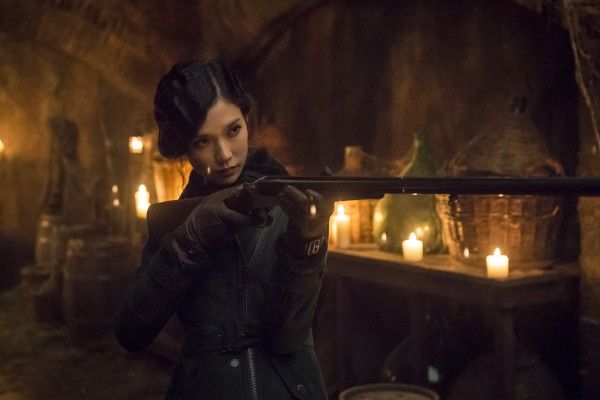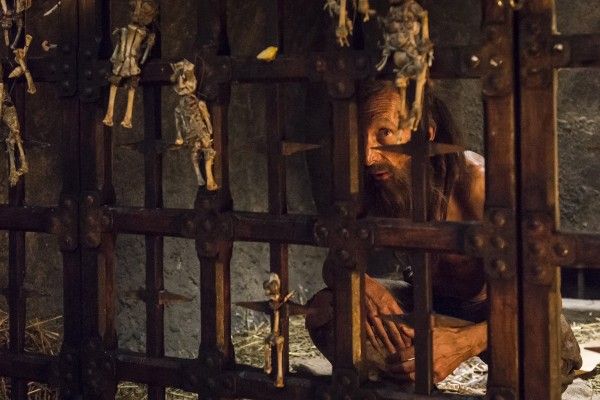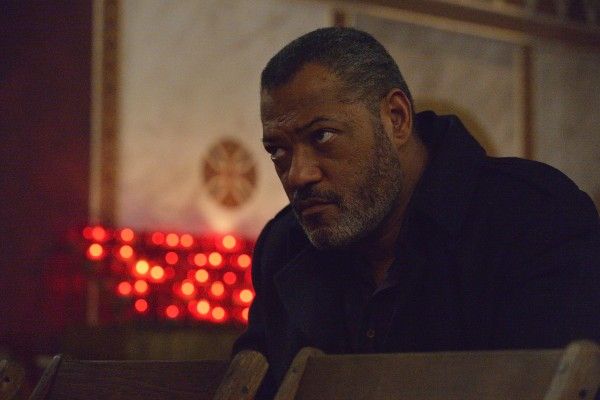In which we take a jaunt with Will Graham to inspect the expectedly Dracula-like childhood home of Hannibal Lecter in Lithuania, and begin brushing up against a tonnage of backstory involving the gentleman-cannibal. Interestingly, however, Bryan Fuller and his crew smartly avoided getting caught up in Hannibal's origins story, primarily his relationship with Mischa, his sister, whom he was seemingly forced to dine on at a young age. This is not to say that "Secondo" is the last we'll hear of what went down in the literal castle where Hannibal started to become who he is, but the third episode of the season didn't slow down to allow for a deluge of the past to take over the kinetic present that Hannibal Season 3 has been most prominently marked by thus far.
A favored symbol in the season has been snails, first seen being plucked off of Gideon's severed arm, one by one, as Hannibal prepared one of Gideon's last meals, which often included his own flesh as the primary protein. In that scene, Hannibal relays that snails carry the taste of what they've eaten, that you can taste their diet and, in essence, their experiences when you eat them. As Will makes his way into Hannibal's old home, specifically the dungeon, the snails are seen hanging off of pieces of rotted, decrepit wood and other dusty or rusty knick-knacks, and one is even plucked and scarfed down by the imprisoned derelict (Julian Richings) that Will finds in the dungeon, right before he is properly introduced to Chiyo (Tao Okamoto), one of Hannibal's old acquaintances. Just as the snails that Hannibal sautéed carried the taste of the meat that they had been living on, Hannibal still carries the impression of what he did and what was done to him in this Lithuanian castle, and that very same abode now carries the unmistakable impression of the monster that was borne within its many, many walls.
Similarly, Hannibal has left his indelible mark on Will, who now freely toys with others to make them kill as he was forced to kill by his former psychiatrist. Though the aesthetics of Fuller's series remains every inch as intoxicating and alluring as they have been so far this season, "Secondo" is a script-first episode, clearing up motives and intentions that have been hard to pin down in this series. For Hannibal, his interactions with Bedelia are offering increasing clarity into his relationship with Will and their...let's call it "complicated" partnership; she is, after all, his psychiatrist. It's Bedelia who sees that, as much as Hannibal may just be embracing his true self by sticking an ice pick into a stuffy art historian's head, his reintroduction to killing in Italy is also a calculated move to draw in Will and, now, Jack, who has come to Palermo to find and help Will. "Aesthetics become ethics" said Hannibal in "Antipasto," and as confusing and wrong-headed as that might sound, he seems to be embracing the double-or-triple meaning of his actions, though there's no mistaking the certainty of his final line in "Secondo."
When Hannibal puts the ice pick in Sogliano (Rinaldo Rocco) and Bedelia finally pulls it out, he squabbles over whether it was him who actually killed him or his better half. It's the same trick he's always played, setting up a predicament that tests the will and survival instincts of someone else, and Will replicates it perfectly with Chiyo, who is forced to kill the crazed cannibal that Hannibal left in her care when she refused to let him have his way with the man. In essence, Will frees Chiyo from having to grapple with the morals of letting the man live or die, and makes it a matter of his life or hers. That being said, he's also becoming increasingly sharp at manipulation and mordant, to the point that he's more comfortable than ever using the body of the imprisoned man as the centerpiece of an expressive death piece, one that, in a nice nod, is nearly identical to the death's head moth that served as the primary symbol in The Silence of the Lambs.
"All sorrows are borne if you put them into a story" says Chiyo at one point in the episode, quoting the Danish author Isak Denisen, who penned Out of Africa and, more importantly, Babette's Feast, a story (and subsequent film) about a grand meal meant to bring a small community together. In actuality, Denisen was the pen name for Karen Blixen, who also wrote Seven Gothic Tales, a famed collection in Denmark, and her use of an alias gives some sense as to what Hannibal and Will are up to. Unable to face the horror of what happened with Mischa, Hannibal created stories of himself, used his intellect to create a maze of half-truths and outright lies to divert anyone from getting ahold of what really happened when he was a boy and young man in Lithuania. He has purged his past by creating the well-tailored genius-killer he is today, but Will is beginning to see his beginning, to understand why all the stories and endless knowledge were necessary to Hannibal going on in his life. When Hannibal says he must he Will at the end of the episode, the declaration might sound like a threat but, as Bedelia points out, it's also suggests a certain fragility in Hannibal, an instant connection made between his love for Will and Mischa, whom he could only forgive or ask forgiveness from by consuming.
★★★★ Very good — Damn fine television




